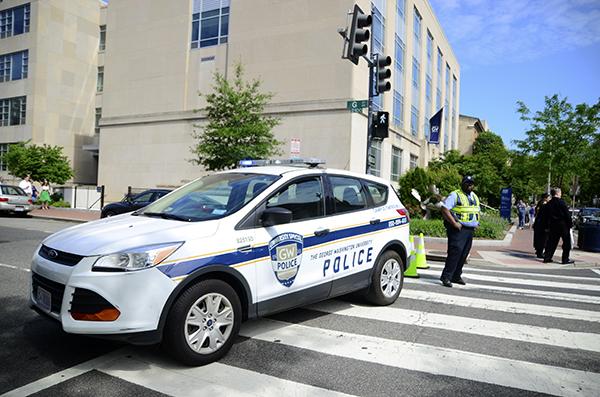Experts say GW’s new head of the University Police Department has the skills and experience that will serve her well on the job, despite her lack of previous experience leading a campus police force.
RaShall Brackney, who starts her new position as UPD chief next month, has spent 30 years working in an urban area as a veteran of the Pittsburgh Bureau of Police and has worked with university police forces, a set of skills experts say will help her adapt to her role at GW.
Experts also say that her experience in the city police force in Pittsburgh could help Brackney fill the communication gap between UPD and the Metropolitan Police Department, a problem that has led to communication errors between the departments in the past.
In the fall of 2013, MPD and UPD mishandled two gun threats on campus. MPD took several hours to inform campus police of an armed robbery on campus, and a week later, campus police notified MPD of a gun threat in South Hall at least 15 minutes after UPD found out about the incident.
This February, GW notified students of a robbery about an hour after the MPD sent out its own separate alert.
Brackney has been a commander in Pittsburgh’s police force for 15 years, where she currently is in charge of the major crimes division. She was also responsible for Pittsburgh’s SWAT team, accident investigations and hostage negotiations. Brackney will replace former UPD chief Kevin Hay, six months after his retirement in November.
Brackney was unable to immediately return requests for comment because she is on her honeymoon, University spokeswoman Maralee Csellar said.
Sonya Toler, a public information officer at Pittsburgh’s public safety department, said she is not able to provide any information about Brackney’s experience or qualities because Brackney has not formally informed the force that she is leaving.
Chuck Drago, a former police chief who now consults police departments, said that Brackney’s experience with elected officials during her time in Pittsburgh is similar to a college police chief working with administrators, a crossover that could be useful in her new role.
“Coming from a city police department, she would understand the issues for a city police department and how they react in a college police department,” Drago said. “She’ll bring that perspective to the University.”

S. Daniel Carter, a campus security expert, said campus police departments generally take on more diverse roles than city police, including functioning as security guards and responding to medical calls.
He added that colleges frequently pick a new police chief from someone who works in a city police department, but added that Brackney will need to learn the specifics of the GW community to find out how to adapt her skills for Foggy Bottom.
“There are many campus police chiefs who come from municipal agencies,” Carter said. “That was for many years a far more common approach than having someone rise through the ranks in the campus police department.”
Brackney also received undergraduate and graduate degrees from Carnegie Mellon University and is currently working towards a doctoral degree in instructional management and leaderships at Robert Morris University, according to a University release.
Michael Dorn, the executive director for the non-profit campus safety organization Safe Havens International, said having a sharp mind paired with communication and leadership skills can better prepare an officer for a position than an in-depth level of experience in a particular field. He said Brackney’s pursuit of a Ph.D. is especially impressive for the position.
“I would be more focused on her master’s and what her Ph.D. is,” Dorn said. “Those would be more relevant than experience. Those types of experiences pertain very much to leadership.”
Dorm added that Brackney’s experience with several divisions of the Pittsburgh Bureau of Police, like the major crimes division and her operations as an officer in the Pittsburgh Municipal court building, will help her balance her multiple responsibilities on campus.
“They don’t want you to be so fixated on your own division,” Dorn said. “It provides a strategic thinking experience, beyond just one aspect of the job.”








